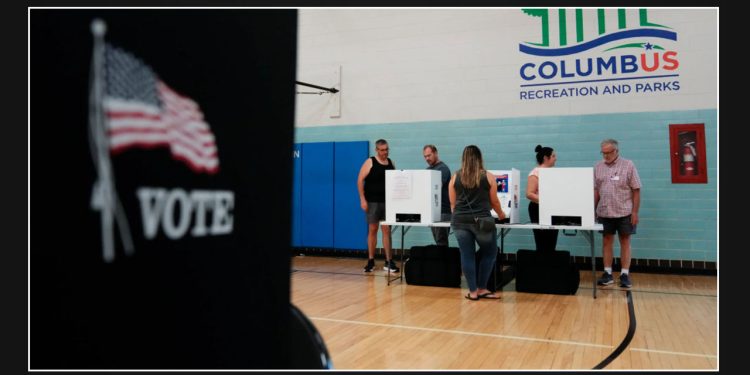On Monday, a federal judge ruled that Ohio’s election law is in violation of the rights of individuals with disabilities who depend on caregivers or family members to return their absentee ballots.
A lawsuit successfully challenged a rule that restricted only specific family members from assisting hospitalized or homebound relatives with an illness or disability. The list of eligible helpers included spouses, parents, siblings, and grandparents, but excluded grandchildren and caretakers from handling absentee ballots on behalf of another person. The decision marks a significant change in the state’s policy regarding who can assist with such matters.
Ohio’s law that prohibits people with disabilities from getting assistance from anyone except their employer or union representative when voting has been deemed a violation of the federal Voting Rights Act by U.S. District Judge Bridget Meehan Brennan. As a result of her decision, Ohio’s law is no longer enforceable. The federal Voting Rights Act permits voters with disabilities to obtain help from anyone except their employer or union representative.
Jen Miller, the executive director of the League of Women Voters of Ohio, expressed gratitude to the court for upholding the Voting Rights Act. She stated that the decision is crucial because it ensures that grandkids, roommates, and other common sense helpers can assist their loved ones without the fear of facing felony charges. Miller further added that the ruling is a victory for Ohio voters with disabilities who face difficulties in traveling to the county drop box or sealing the ballot envelope. She believes that this decision will make voting more accessible for all.
Last year, The League filed a lawsuit against the policy. This happened after Ohio’s governor, Mike DeWine, signed one of the most rigorous voter ID laws in the United States. The law was part of a comprehensive reform of the state’s election system.
According to Brennan, the new election law maintains the same list of relatives who are prohibited from possessing someone else’s absentee ballot, which was already considered a felony. However, the updated statute has expanded the scope of the crime to include the act of returning someone else’s ballot. This means that organizations like the League, which assist voters with their ballots, could be at risk of facing criminal penalties.
Ohio’s law is aimed at regulating the practice of ballot collection, commonly referred to as ballot harvesting, which was the subject of controversy during the 2020 election, according to Republicans. The Republican National Committee and Ohio Republican Party have intervened in the lawsuit, arguing that they have a significant interest in preserving the “competitive environment” of elections by preventing any alterations.
According to the National Conference of State Legislatures, absentee ballot return can be done by someone else in thirty-five states. Some states restrict this privilege to family members only, while others allow caregivers or anyone authorized by the voter to do so.
“Our counsel, the attorney general, will be consulted for our next steps as we strongly disagree with the decision,” expressed Ben Kindel, spokesperson for Secretary of State Frank LaRose. He further added, “The General Assembly has the exclusive authority to establish the rules of Ohio’s elections, and this decision challenges a law passed by them. Therefore, they will likely review the court’s ruling in this matter.”
Read More:
- ODNR looks for candidates to join the Natural Resources Officer training program
- Campbell County units help search for and rescue Ohio man in Kentucky after 2 weeks

